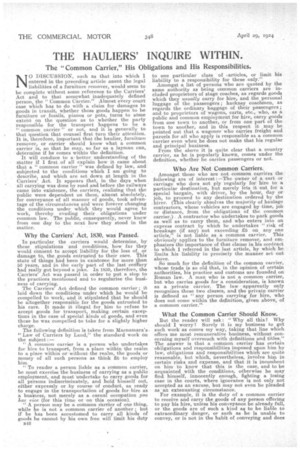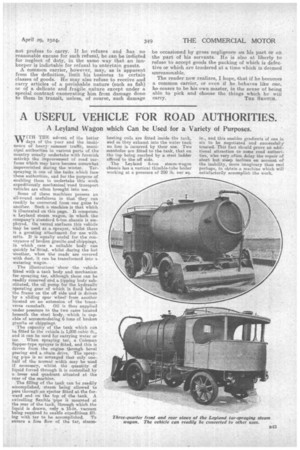THE HAULIERS' INQUIRE WITHIN.
Page 26

Page 27

If you've noticed an error in this article please click here to report it so we can fix it.
The "Common Carrier," His Obligations and His Responsibilities.
N0 DISCUSSION, such as that into which I entered in the preceding article anent the legal liabilities of a furniture remover, would seem to be complete without some reference to the Carriers' Act and to that somewhat inadequately defined person, the "Common Carrier." Almost every court case which has to do with a claim for damages to goods in transit, whether those goods happen to be furniture or fossils', pianos or pots, turns to sOme extent on the question as to whether the party responsible for the transport happens to be a " common carrier" or not, and it is generally to that question that counsel first turn their attention. It is, therefore, important that the haulier, furniture remover, or carrier should know what a common carrier is, so that he may, so far as a layman can, determine if he comes within the definition.
It will conduce to abetter understanding of the niatter if I first of all explain how it came about that a "common carrier" was defined by law, and subjected to the conditions which I am going to describe, and which are set down at length in the Carriers' Act. It appears that, in the days when all carrying was done by road and before the railways came into existence, the carriers, realizing that the public were dependent on them-, almost absolutely, for conveyance of all manner of goods, took advantage of the circumstances and were forever changing the conditions under which• they would agree to work, thereby evading their obligations under common law. The public, consequently, never knew from one day to the next how they stood in the matter.
Why the Carriers' Act, 1830, was Passed.
In particular the carriers would determine, by these stipulations and conditions, how far they would consent to accept liability for the loss of, or damage to, the goods entrusted to their care. This state of things had been in existence for more than 50 years, and in the early part of the last century had really got beyond a joke. In 1800, therefore, the Carriers' Act was passed in order to put .a stop to the practices mentioned and to regularize the business of carrying.
The Carriers' Act defined the common carrier ; it laid down the conditions under which he would be compelled to work, and it stipulated that he should be altogether responsible for the goods entrusted to his care. It made it illegal for him to refuse to accept goods for transport, making certain exceptions in the case of special kinds of goods, and even those he was compelled to take for a slightly higher charge.
The following definition is taken from Macnamara's "Law of Carriers by Land," the standard work on the subject :— " A common carrier is a person who undertakes for hire to transport, from a place within the realm to a place within or without the realm, the 'goods or money of all such persons as think fit to employ him.
"To render a person liable as a common carrier, he must exercise the business of carrying as a public employment, and Lust undertake to carry goods for all persons indiscriminately, and hold himself out, either expressly or by course of conduct, as ready to engage in the transportation of goods for 'hire as a business, not merely as a casual occupation pm hac vice (for this time or on this occasion).
"A person may be a common carrier of one thing, while he is not a common carrier of another ; but if he has been accustomed to carry all kinds of goods he cannot by his own free will limit his duty B42 to one particular class of ,articles, or limit his liability to a responsibility for these only."
Amongst a list of persons who are quoted by the same authority as being common carriers are included proprietors of stage coaches, as regards goods which they usually carry for hire and the personal luggage of the passengers ; hackney coachmen, as regards the ordinary baggage of their passengers ; and to proprietors of wagons, carts, etc., who, as a public and common employment for hire, carry goods from one town to another, or from one part of the town to another, and in this respect it may be pointed out that a wagoner who carries freight and parcels for all who apply is responsible as a common carrier even when he does not make that his regular and principal business.
From the above it is quite clear that a country carrier, as he is popularly known, comes under the definition, whether he carries passengers or not.
Who Are Not Common Carriers.
Amongst those who are not common carriers the following are of interest :—The owner of a cart or carriage who does not ply regularly for hire to a particular destination, but merely lets it out for a special bargain' with driver, by the hour, day or job, to proceed to any destination ordered by the hirer. (This clearly absolves the majority of haulage contractors, whose vehicles are engaged by time, job or distance, from the obligations of the common carrier.) A contractor who undertakes to pack goods as well as to carry them, and who enters into an express contract by which he undertakes " risk of breakage (if any) not exceeding £5 on any one article, is not liable as a common carrier. This obviously applies to the furniture remover, and cm; phasizes the importance of that clause in his contract to which I referred in the. last article, by which he limits his liability in precisely the manner set out above.
So much for the definition of the common carrier, whose trade is so old that, in the opinion of certain authorities, his practice and customs are founded on Roman law. A man who is not a common carrier, but who carries goods for a consideration, is known as a private carrier. The law apparently only recognizes these two classes, and the private carrier is defined as "any person carrying for hire, who does not come within the definition, given above, of a common carrier."
What the Common Carrier Should Know.
But the reader will ask: "Why all this ? Why should I worry? Surely it is my business to get such work as comes my way, taking that line which offers me most remunerative business, without concerning myself overmuch with definitions and titles." The answer is that a common carrier has certain obligations and responsibilities imposed upon him by law, obligations and responsibilities which are quite reasonable, but which, nevertheless, involve him in certain risks and expense, and that it is incumbent on him to know that this is the case, and to be acquainted with the conditions, otherwise he may find himself, innocently enough, fighting a losing case in the courts, where ignorance is not only not accepted as an excuse, but may not even be pleaded as an extenuating circumstance. For example, it is the duty of a common carrier to receive and carry the goods of any person offering to pay his hire, unless his conveyance be already full, or the goods are of such a kind as to be liable to extraordinary danger, or such as he is unable to convey, or is not in the habit of conveying and does not profess to carry. If he refuses and has no reasonable excuse for such refusal, he can be indicted for neglect of duty, in the same way that an innkeeper is indictable for refusal to entertain guests. A common carrier, however, may, as is apparent from the definition, limit his business to certain classes of goods. lie may also refuse to receive and carry articles of a perishable nature (such as fish) or of a delicate and fragile nature except under a special contract exonerating him from damage done to them in transit, unless, of course, such damage be occasioned by gross negligence on his part or on the part of his servants. He is also at liberty to refuse to accept goods the packing of which is defective or which are tendered at a time which is deemed unreasonable.
The reader now realizes, I hope, that if he becomes a common carrier, or even if he behaves like one, he ceases to be his own master, in the sense of being able to pick and choose the things which be will carry. THE SKOTCH.






























